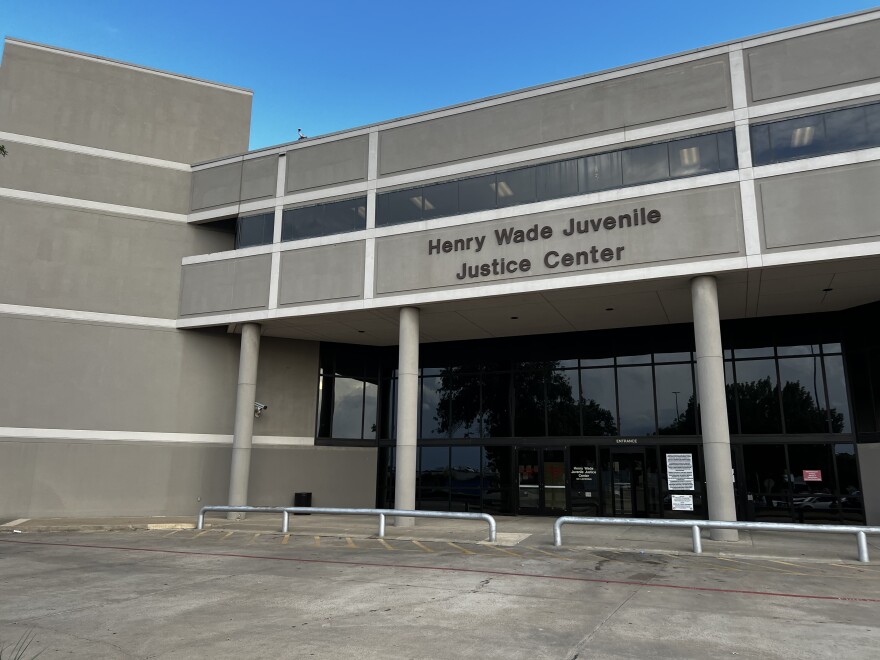The Henry Wade Juvenile Justice Center is where kids in Dallas are detained while they wait for their cases to be adjudicated.
Parents say it's also a place where their children are held alone in their cells for long periods of time, underfed and not getting medical care they need, according to the Dallas Morning News.
Josephine Peterson's been covering this story and other issues impacting Dallas County for the News. She sat down with KERA's Bekah Morr.
The below transcript has been edited for length. You can listen to the entire interview by clicking the button at the top of this story.
You talk to parents of children who are currently detained at Henry Wade. What did they have to say?
A lot of the parents had shockingly similar stories, which was hard to hear. You know, it was very surprising that they all kind of complained about the fact that their kids were alone for most of the day in these really small cells with a concrete bench. And they get a little pat of about three inches on top of that, and that's where they sleep. They have a steel metal toilet with a sink on top of it. And that's where they spend, you know, 23 hours a day. I heard some people say that they'll be in there for several days and, you know, there's nothing for them to do. Sometimes they'll spend their days drawing, but a lot of the time they'll just be sleeping in there.
What does the Dallas Juvenile Justice Department have to say about these allegations of how they're treating kids?
The juvenile department has been saying that they feel that they were unaware of these cases, that they had no idea what was going on. The director, I've spoken with him a couple of times, and he's saying, if this is true, that he wants to do something about it.
And so over the juvenile detention center and all of Dallas County's juvenile facilities is the (juvenile) board, and that's made up of elected officials and judges. In their meetings, they a lot of times have said they don't think this has been a problem.
There's been commissioners who've said, you know, "I think that there's some problems going on," they've started to hear from parents themselves. And for them, they're saying, you know, "we need to look further at what's going on here and we need to see if these kids are being held behind the door as long as these parents are saying they are." They made a request — a subpoena to the juvenile department, and the juvenile department has since slapped them with a lawsuit saying, that "you don't have a right to access these records." So there's kind of been a bit of tension on the juvenile board because, there sits the commissioners and the judges. We're starting to see that kind of tension play out in the commissioners saying, "please, we want any type of study, any independent consultant to come in and confirm what these parents are saying," and the juvenile board is saying, "we'll talk about this later, this is not a good time," or "we don't think this is happening."
In your reporting, you talk a little bit about some small improvements that have been made as these parents have come forward with their complaints. But are there any broader improvements parents are really hoping for?
Every parent I talked to largely says the reason that they're talking to me is that they want conditions to improve beyond their own kid. You know, even if things get better after their kid leaves there, they feel like no child should be left in these conditions. And so they're asking for any sort of program or help that anyone could give them that would allow the kids outside of their room for most of the day, or get them more adequately fed or get services in there that need to be given for medical help.
I think a lot of them are really worried about the fact that these kids seem to be behaving differently. You know, they're saying that their kids are not who they used to be. They are a shell of who they were. They aren't as, you know, goofy and fun as they used to be because they don't get the type of interaction, social interaction, as they do in the outside.
This has been an ongoing issue for several years. Some of the things that a lot of parents have complained about is the fact that these kids are kind of stuck in there. You can't bond out of this system like you can in the adult system. And so once prosecutors and a judge decide that you're going to be in the detention center, you're in there until the judge deems that you can leave. So for months on end, you know, I've heard of cases where kids have gone in for stealing a car and they're stuck in there for months. And, you know, that would not happen if they were an adult. If you could bond out the next day, if you had done some type of petty theft or something like that. And so it's it's been a little shocking to hear all of these juvenile advocates in Texas say that the point of juvenile justice is rehabilitation, and it feels like that isn't necessarily happening.
Josephine Peterson covers Dallas County for the Dallas Morning News.


